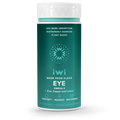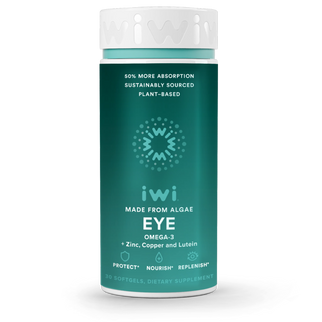Have you noticed a gritty, burning, or irritated sensation in your eyes? Maybe you notice yourself blinking extra, rubbing your eyes more frequently, or using your eye drops more often. You might be thinking it’s just allergies and it will go away, but you might be experiencing dry eye syndrome.
Dry eyes can be a source of frustration and impact your day-to-day life, so we want to help you find quick and long-term relief. If you’re a dry eye patient looking for short-term help and long-term eye care, read below.
What Are Dry Eyes?
What are dry eyes, and what makes them so different from allergies? First, it’s important to consider whether or not you are experiencing any symptoms besides dry eyes. You also want to decide if this is a persistent occurrence or if it’s only bad during allergy season.
Dry eyes are a common condition and happen if your tear ducts aren’t working correctly. Your eyes always have tears, even when you’re happy. This is because tears help lubricate your eyes and moisturize them.
There are special glands around your eyes that help make tears. Tears, a combination of water, oil, mucus, and even antibodies, are important for your eye health. So when you experience dry eyes, it means those glands may be out of balance and can’t perform as they should.
What Are Possible Causes of Dry Eyes?
Dry eyes are annoying, but it’s even more annoying not to know what is causing them. Want to know a few ideas that can cause your eyes to dry up? There can be a variety of different factors that contribute to this, such as:
- Being around an air conditioner or heater
- Side effects of certain drugs like antihistamines
- Hormone changes
- Menopause
- Certain autoimmune diseases like rheumatoid arthritis
What Are the Symptoms of Dry Eyes?

As you might expect, the most common symptom of dry eyes is having dry, irritated eyes. Here’s what they can feel like:
- A stinging, burning, or scratchy sensation in your eyes
- Extra sensitivity to light
- Redness in your eyes
- A gritty feeling in your eyes, or a sensation of having something in your eyes
- Difficulty wearing contact lenses
- Difficulty with nighttime driving
- Watery eyes, which is your body's response to the irritation of dry eyes
- Blurred vision or eye fatigue
One of the main distinctions between dry eyes and allergies is itchiness. When you have dry eyes, your eyes may feel irritated and gritty.
What Are Short-Term Relief Options for Dry Eyes?
You might need some quick relief to help your dry eyes (especially if you need to look at a computer screen). That’s why we have a quick list of ideas to help you find some relief.
Warm Compresses
A warm compress can provide a short-term treatment of dry eyes, depending on how irritated they are. Dampen your compress with warm water and place it on your eyes for a few minutes. This can help support proper blood circulation and oil gland function.
Rest Your Eyes
If you have some time to spare, resting your eyes can be a helpful way to try and get some moisture back. Take a breather and close your eyes. You will experience some relief while they are closed, but this could also be a good habit to try and incorporate into your daily routine in the morning and at night.
Reduce Screen Time
Unfortunately, a quick way to exacerbate your dry eyes is by looking at screens for a long time. Looking at screens often and for too long can cause eye strain and increase your risk for dry eyes.
Use Eye Protection
Your healthcare provider or an ophthalmologist might prescribe eye drops to help get your eyes lubricated and moisturized. You could also find over-the-counter artificial tears in most pharmacies if you don’t have time to schedule an appointment. But protection can take many different forms, such as sunglasses. Although it may seem obvious, it’s important to remember that the sun can harm the eyes, so having a stylish pair of sunglasses can make you look great and potentially make your eyes feel better.
What Are Long-Term Relief Options for Dry Eyes?

Now that you know some short-term relief for your dry eyes, you are probably wondering how to alleviate and prevent dry eyes so that you don’t have to keep dealing with them. At iwi life, we want to provide you with the tools so you can take back better living.
Whether it’s to support your heart, eye, brain, or joint health – we’ve got you covered. We want you to find better living quickly and easily.
Read on to see how omega-3 fatty acid supplements can play a big role in helping you with your dry eyes.
What Are Omega-3s?
Omega-3s are more than just a buzzword in the health and wellness world. They’re a type of essential fatty acid that our bodies can't produce on their own, making it crucial to obtain them from our diet or through supplements. Let's take a closer look at what omega-3s are and why they matter for your health, especially for your eye health.
Omega-3s are polyunsaturated fatty acids, often recognized for their potential health benefits. They're called "essential" because our bodies can't manufacture them, and hence we must source them from our diet or supplements. These fatty acids are integral to the healthy function of our cell membranes, which serve as the gatekeepers of our cells, controlling what goes in and out.
There are three main types of omega-3 fatty acids: ALA, EPA, and DHA.
ALA (alpha-linolenic acid) is primarily found in plant sources like flaxseeds, chia seeds, and walnuts. Our bodies can convert a small amount of ALA into EPA (eicosapentaenoic acid) and DHA (docosahexaenoic acid), but not efficiently, making it important to also get these from our diet or supplements.
EPA and DHA are long-chain omega-3 fatty acids primarily found in oily fish such as sardines, mackerel, salmon, and tuna, as well as algae such as Spirulina, Chlorella, seaweed, and nori. These are the omega-3s that are readily used by our bodies and are often the focus of scientific research due to their potential health benefits.
When it comes to eye health, DHA is a star player. It's found in high concentrations in your retinas, the part of your eye that detects light and color. DHA plays a crucial role in maintaining the retinal health and function, making it a key nutrient to consider for maintaining eye comfort, especially if you're dealing with dry eyes.
How Can Omega-3 Dietary Supplements Help Dry Eyes?

The potential role of omega-3s in helping dry eyes is an exciting area of research with numerous studies being conducted to support theories. For example, a 2016 study suggests that these essential fatty acids may assist in managing some of the discomforts associated with dry eyes.
Supporting the Health of Your Cell Membranes
Omega-3s are fundamental to your body's overall wellness because they contribute to the maintenance of your cell membranes. These membranes are present in every part of your body, including your eyes. Increasing your intake of omega-3s could potentially support the health of your cell membranes, which in turn may promote the well-being of your eyes.
Maintaining Your Eyes’ Tear Film
One of the key roles of omega-3s in eye health is their potential contribution to the maintenance of the tear film. This film, produced by your eyes' oil glands or meibomian glands, is vital for lubricating the surface of the eye. Research suggests that increasing the amount of omega-3s in your diet may support the proper functioning of these glands and help maintain the tear film, potentially contributing to eye comfort.
DHA in Retina Support
Among the different types of omega-3s, DHA deserves special mention when it comes to eye health. Research shows that DHA is found in high concentrations in your retinas. Studies suggest that it plays a role in supporting the integrity of your retinas and overall eye health.
Eye Hydration
Dry eyes often lack adequate hydration, which can lead to discomfort. Omega-3s, particularly EPA, may contribute to eye hydration by supporting the production of healthy oils in your eyelids. These oils are an essential component of tears and help prevent tear evaporation, keeping your corneas and the rest of the ocular surface well-hydrated and comfortable.
What Are the Additional Health Benefits of Omega-3s?
Besides offering relief to dry eyes, omega-3 fatty acids are a powerhouse of other health benefits. In fact, they play several vital roles in supporting your overall health and well-being. Let's delve a little deeper into the additional benefits you can expect to enjoy by increasing your omega-3 intake:
Brain Function
If you're looking for a brain boost, then look no further than these essential fatty acids. Omega-3s, especially DHA, are crucial for brain health. They’re an integral part of brain cell membranes and are necessary for brain cell growth and communication. As a result, omega-3s can contribute to cognitive wellness and overall brain health.
Joint Support
If you're seeking additional comfort for your joints, including a few more sources of omega-3s might be a good addition to your routine. They’re often associated with promoting joint comfort and mobility, which could be beneficial for those leading an active lifestyle.
Mental Health
Emerging research suggests that omega-3s may contribute to emotional wellness. They are believed to play a role in mood regulation and overall emotional health.
Skin Health
Omega-3s also play a crucial role in keeping your skin healthy. They help support balanced oil production and hydration and can help ease blemishes and dry skin. Not to mention, they can protect your skin from sun damage.
Pregnancy Support
Omega-3s, specifically DHA, are essential for neurological and visual development in infants. Therefore, they're recommended for expecting mothers to ensure the healthy growth and development of their baby's brain and eyes.
Adding Omega-3s to Your Routine
DHA is typically found in most fatty fish, but many people don’t eat enough fish to satisfy their daily requirements. Not everyone likes the taste of fish, while others are following a special diet, like vegan, or are allergic.
That’s why we have a simple and effective way to get around these challenges: supplements to potentially help improve your wellness. And better yet, we make ours with algae oil, so you don’t get the fishy aftertaste from fish oil but still get all the benefits.
iwi life’s Eye Supplements
Supplements can be a great way to get the benefits you need without compromising your preferences. It is also much less of a commitment to take a supplement daily rather than buy all the ingredients at the grocery store and then prepare it each night.
That’s why we have our supplement specifically made for your eye health. Our algae oil supplements –– which are clinically proven to absorb 1.7X better than fish oil supplements –– contain 285 milligrams of total omega-3 fatty acids per serving.
At iwi life, we recognize the importance of omega-3s. We know how critical they are to your body, so we wanted to make supplements that can help you accomplish your health goals and help you create the healthy life you want and deserve.
Vision Support With iwi life
Whether it’s supporting your overall wellness with our omega-3 supplements, protecting your eye health, or wanting to increase your DHA levels – we have everything you could need to accomplish your wellness goals.
Even if you don’t suffer from dry eyes, making sure you have enough DHA levels in your diet is important to keep protecting your eyes and supporting your wellness. We want to help ensure your health and the quality of your life, so let us help you maintain your health with our algae omega-3 supplements.
Better vision, a better future, and better living start here with iwi life. Are you ready to return to your old life — the one before your dry eyes? Let’s start together.
Sources:


















